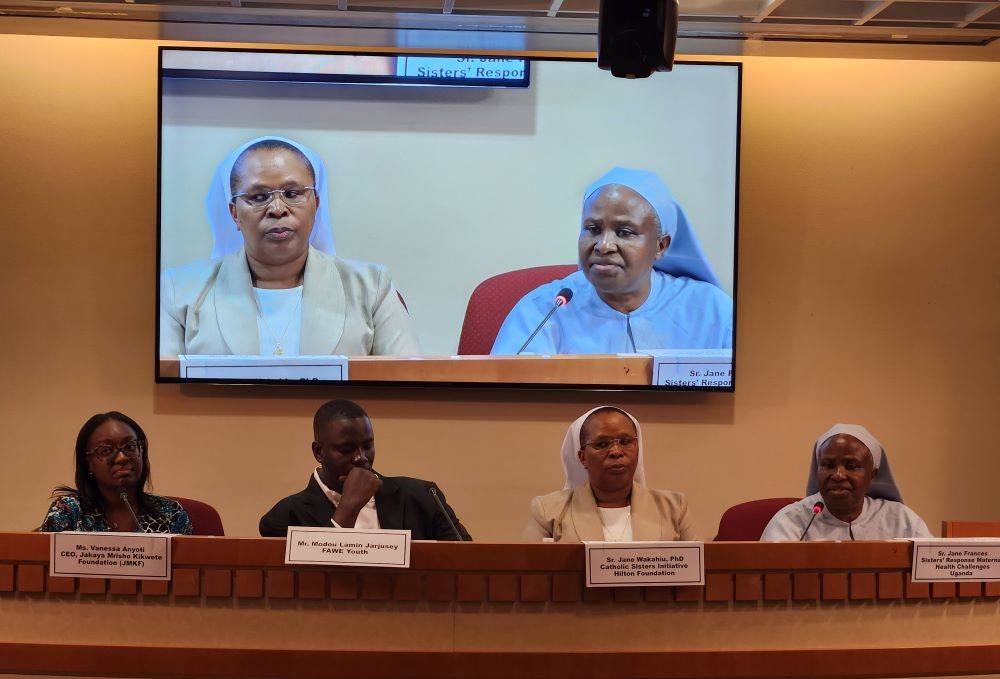
Sr. Jane Wakahiu, associate vice president for program operations and head of Catholic Sisters for the Conrad N. Hilton Foundation, speaks during a Sept, 20 forum at the Permanent Mission of the African Union at the United Nations. At her left is Ugandan Sr. Jane Frances Kabagaaju. (Chris Herlinger)
Catholic sisters and lay congregational representatives, joined by clergy and lay allies and partners, say that a just-concluded "Summit of the Future" at the United Nations can help refocus needed international attention on combating global poverty and other related challenges.
"The voices of civil society — and especially the voices of Catholic sisters — are so important at this summit because sisters know the root cause of social and environmental injustices," said Beth Blissman, the Loretto Community's representative at the U.N.
The Summit of the Future, held Sept. 22-23, was partly an opportunity for U.N.-member states to reaffirm their commitment to the U.N.'s Sustainable Development Goals — something they did in adapting a Pact for the Future, in which the states pledged to accelerate progress on SDGs. It also was a way to continue to tackle the challenges of global climate change and the digital divide.
"We must never lose sight of those future generations to whom we owe our best efforts to create a world that uplifts and empowers all of humanity, leaving no one behind," Philémon Yang, president of the 79th session of the General Assembly, said during the summit's closing.
Catholic sisters, representatives of nongovernment organizations and U.N. officials have said that, while some progress has been made, reaching the SDGs by the target year of 2030 is not at all likely. That is because of a host of factors, including the global pandemic, economic downturns and increased tensions and wars throughout the world.
In this and other recent gatherings, it is important that the U.N. hear from the grassroots and from those, like Catholic sisters, who work with people at the margins, said Adrian Dominican Sr. Durstyne "Dusty" Farnan, who represents the Dominican Leadership Conference.
"We are sort of like the 'watch guards' of what is really going on, because [government representatives] sometimes just want to paint a beautiful picture about what's happening," Farnan told Global Sisters Report.
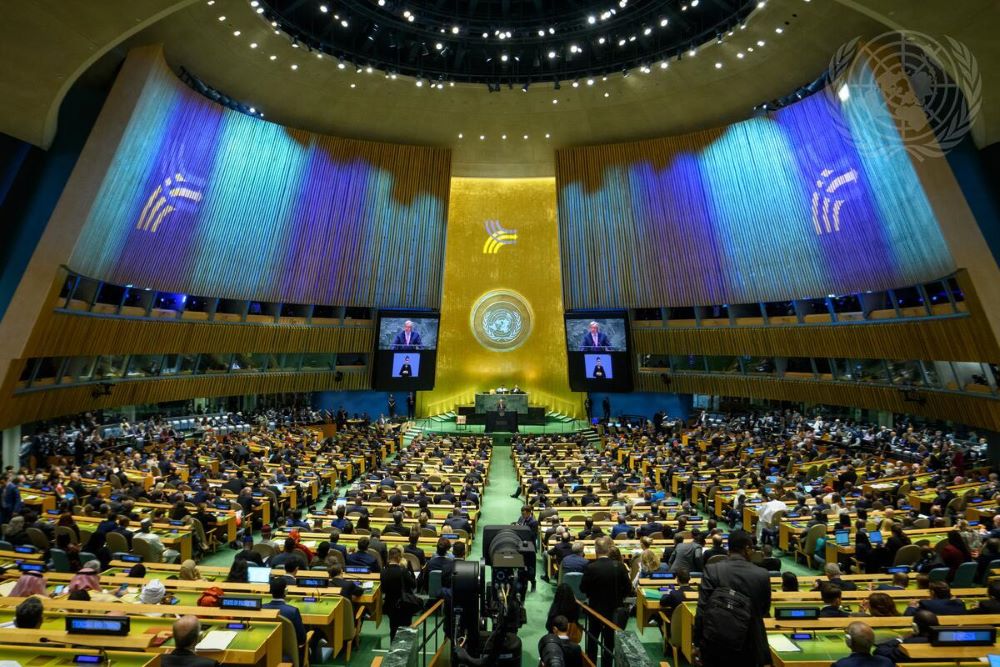
United Nations Secretary-General António Guterres, at the podium and on screens, addresses the opening of the Summit of the Future on Sept. 22. During the Sept. 22-23 event U.N. member states reaffirmed their commitment to sustainable development goals. (UN/Loey Felipe)
The backdrop: A struggling world
The Catholic presence at the summit was notable. In remarks at the summit Sept. 23, Cardinal Pietro Parolin, secretary of state of the Holy See, noted that the global meeting was "being convened against a backdrop of apparent crisis in the multilateral system. This is largely attributable to the erosion of trust between nations, as evidenced by the growing prevalence and intensity of conflict."
Hope for the future, Parolin said, "should be constructed on a foundation of principles, including the inherent, God-given dignity of every individual, the promotion of integral human development, the equality and sovereign dignity of all nations, and the establishment of trust between them."
Such hope is often grounded in the context of the work of Catholic sisters who, as Blissman noted, "live in the communities where the most vulnerable live, or are connected with those people who experience injustice."
Understanding these root causes of poverty, she said, "can then be lifted up to the [U.N.] diplomats to encourage them to include these realities into policy documents to allow for true, systemic change to occur."
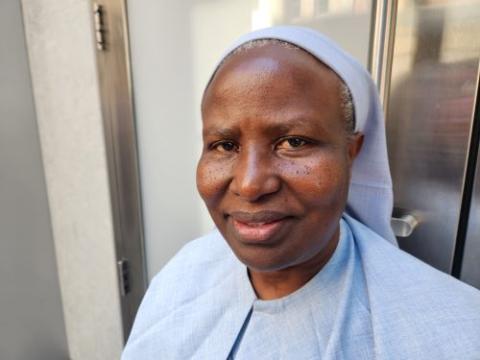
Ugandan Sr. Jane Frances Kabagaaju, a maternal health specialist, participated in the United Nations' Summit of the Future. (Chris Herlinger)
At events during and preceding the formal summit, Catholic sisters did just that: speak of their grassroots experiences. In doing so, they placed their work in the context of needed policy changes.
One of those speaking was Ugandan Sr. Jane Frances Kabagaaju, whose ministry focuses on improving maternal health. A member of the Daughters of St. Therese of the Child Jesus, she is a physician's assistant and country coordinator for maternal health for the Africa Health and Economic Transformation Initiative in Uganda.
Kabagaaju spoke at a Sept. 20 event held at the Permanent Mission of the African Union at the U.N. The forum focused on several of the SDGs, including maternal health.
The event was a collaboration among the Bakhita Partnership for Education; the African Union Centre for Girls and Women's Education; and the Africa Health and Economic Transformation Initiative, with the support from the Conrad N. Hilton Foundation (which is a major funder of GSR).
In her presentation, Kabagaaju spoke of the many challenges maternal health providers face in rural African villages. She said that many mothers delay seeking maternal health services in part because they don't have access to needed information and because they face constant personal challenges stemming from economic poverty.
Kabagaaju said a number of changes could improve the outlook for pregnant women in rural areas, including training for village health teams; workshops for pregnant women; and forming and strengthening care groups for expectant mothers.
She also noted the challenges of infrastructure in rural areas, saying that roads are a constant worry and said improving transportation "to access obstetric facilities in time," must be a priority.
Road neglect and endemic poverty have limited "alternative transport services for health care," Kabagaaju said. As a result, pregnant women "use risky methods such as bicycles or tricycles to access obstetric health care services, and some turn to traditional medicines and traditional birth attendants for maternal health care services."
In a later interview with GSR, Kabagaaju said her call for better health facilities in rural areas is a way of addressing the "root causes" of endemic problems.
"I'm ready to be a voice," she said, adding that she has seen a number of tragedies in her ministry.
One such tragedy occurred in September 2022 when Kabagaaju accompanied a woman who had just delivered her baby but began hemorrhaging, requiring transport from the Nkuruba Health Centre in Rutoma village to a Buhinga hospital in the town, 15 miles away.
The mother died immediately at the hospital, and her death points to the need for better all-around improvements in equipment at rural health facilities.
"When I think of her," Kabagaaju said of the mother, "I want to cry."
Bridging the global and grassroots
Kabagaaju said similar experiences of fellow sisters from Africa make it important for sisters to be heard and seen at forums like the U.N.

A sculpture outside the United Nations' General Assembly Building during the Sept. 22-23 Summit of the Future (Chris Herlinger)
"It is important [for the U.N.] to hear from us," she said, a refrain made by other visiting sisters, who attended the Sept. 20 event, including Srs. Nelly Chisense, a Zambian hospital administrator and Franciscan Missionary Sisters of Assisi, and Hedwig Muse, a member of the Little Sisters of Mary Immaculate of Gulu, Uganda, and a Kenya-based attorney and human rights advocate
In interviews, the sisters said that while the scale of events at the U.N. might seem daunting, their efforts help bridge the gap between the grassroots and global forums.
"It's not in vain; they heard from us," Chisense said. "It strengthens me to go back home and continue the work I am doing,"
Still, Muse inevitably finds herself wondering, "how will this help us?" she said. She is not sure precisely, but said participating gives her an expanded view that will help her in upcoming human rights trainings.
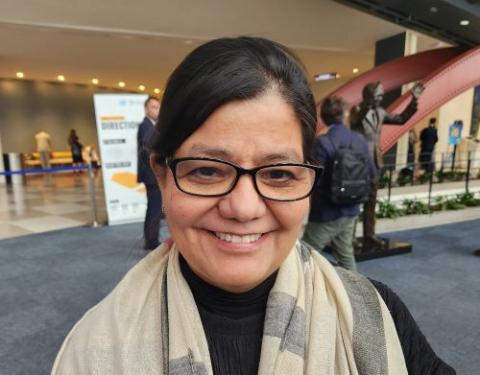
Sr. Beatriz Eugenia Martinez-Garcia represents the School Sisters of Notre Dame at the United Nations. (Chris Herlinger)
A similar question animated Sr. Beatriz Eugenia Martinez-Garcia, who represents the School Sisters of Notre Dame at the U.N. Interviewed during the last day of the summit after attending a session at the U.N. General Assembly, Martinez-Garcia said it is important that Catholic sisters be seen at an event where an important fact — "that all human beings share a common future," she said — is recognized and affirmed.
At the African Union event, Peter Laugharn, the president and CEO of the Conrad N. Hilton Foundation, made a similar point, noting the need to affirm the importance of the SDGs, which he said "are central to building sustainable, inclusive, and prosperous societies." He added: "The SDGs can keep us on track."
Martinez-Garcia noted a similar dynamic, saying the SDGs align with her own congregation's vision of "collaborating together for the common good of all people."
Whether at the U.N. or within congregations, she said, people are asking, "What is the future we want? What is the future we need?"
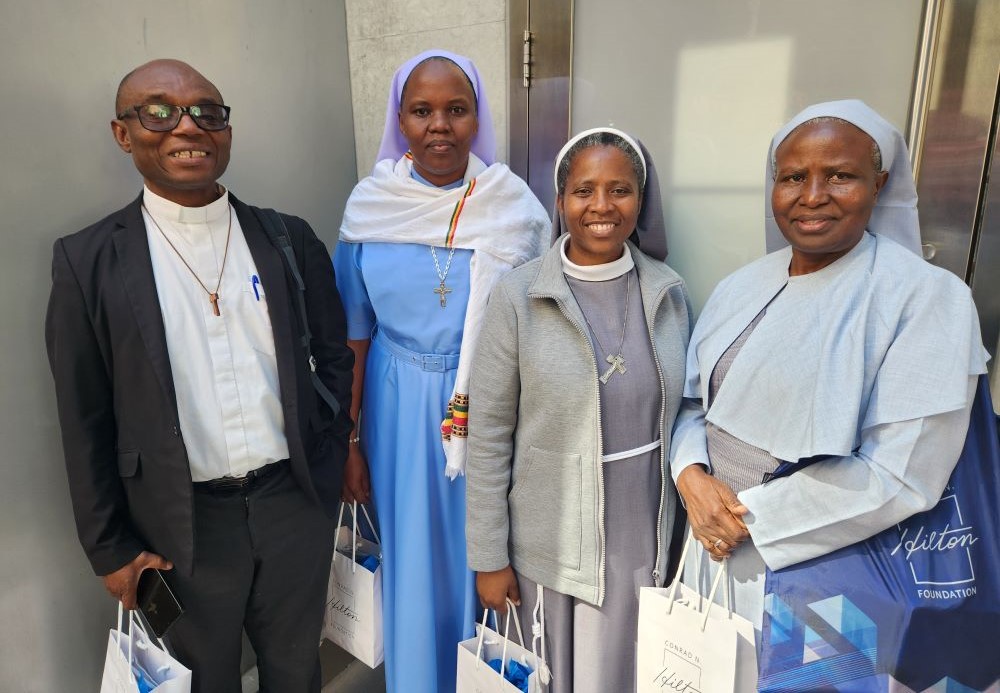
Summit of the Future participants included, from left, Jesuit Fr. Charles Chilufya, representing the Bakhita Partnership for Education; and Srs. Hedwig Muse, Nelly Chisense and Jane Frances Kabagaaju. (Chris Herlinger)
Another summit participant, Sr. Jane Wakahiu, a member of the institute of the Little Sisters of St. Francis, Kenya, and now associate vice president for program operations and head of Catholic sisters for the Conrad N. Hilton Foundation, said it is important that people came together during this and other U.N. events. But the next focus must be "on what comes next."
"Words are necessary but what happens 'after the words?' " she said, adding that the ministries of the church, particularly that of sisters, continues to serve as a model for the type of work needed in a broken and fragmented world. "Sisters stay with the people, and are in solidarity with those suffering."
Jesuit Fr. Charles Chilufya is the director of the Justice and Ecology Office of the Jesuit Conference of Africa and Madagascar and represented the Bakhita Partnership for Education at the summit. He said "sisters are knocking at the door," not only at the U.N. but within the church.
"Their powerful testimony," he said, "is an example of how we can respond to the crises facing the world today."





